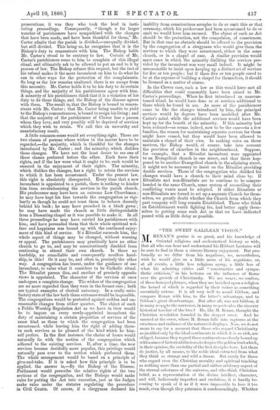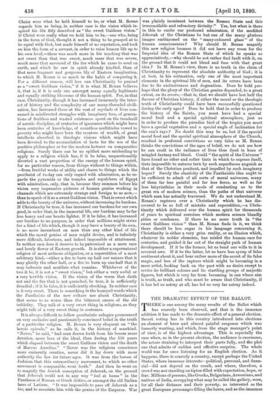"THE SWEET GALILEAN VISION."
RENAN'S genius is so great, and his knowledge of
• Oriental religions and ecclesiastical history so wide, that all who can hear and understand his Hibbert Lectures will be sure to find in them a sincere literary enjoyment. But pro- foundly as we differ from his negations, we, nevertheless, wish he would give us a little more of his negations, or, at all events, a little less religious syrup, a little less of what his admiring critics call " constructive and sympa- thetic criticism," in his lectures on the influence of Rome over the growth of Christianity. We are weary, we confess, of these honeyed phrases, when they are lavished upon a religion the kernel of which is regarded by their coiner as something essentially untrue. It is all very well to assail Gibbon, and compare Renan with him, to the latter's advantage, and to Gibbon's great disadvantage. But after all, was not Gibbon, if in many resKets the narrower, in many respects also the sincerer historical teacher of the two ? He, like M. Renan, thought the Christian revelation founded in the deepest error. And he sneered at the error, where M. Renan falls into raptures at the sweetness and radiance of the natures it displays. Now, we do not mean to say for a moment that those who regard Christianity as justified only by the ideal sentiments in which it is so rich, are obliged, because they regard these sentiments as closely bound up with amass of historical illusion s, to despise the golden fruit which , in their opinion, tin; credulity of the first disciples bore. Let them do justice, by all means, to the noble ideal extracted from what they think so strange and wild a dream. But surely for those who regard even the Christian morality and spiritual teaching as nothing more than one partial and rather arbitrary aspect of the eternal substance of the universe, and who think Christian belief, as a representation of the divine intellect, character, and will, ludicrously imperfect and credulous, it is hardly be- coming to speak of it as if it were impossible to love it too much, even though they patronise it condescendingly. Whether
Christ were what he held himself to be, or what M. Renan regards him as being, in neither case is. the vision which in- spired his life fitly described as "the sweet Galilean vision." If Christ were really what we hold him to be,—one who, being in the form of God, thought it not a thing to be grasped at to be equal with God, but made himself of no reputation, and took on him the form of a servant, in order to raise human life up to his own level,—there was much more in his teaching that was not sweet than that was sweet, much more that was severe, much more that savoured of the fire which he came to send on earth, and which he saw in spirit already kindled, than of that mere fragrant and gorgeous lily of Eastern imagination, to which M. Ronan is so much in the habit of comparing it. For a different reason, still less can Christianity be praised as a "sweet Galilean vision," if it is what M. Renan believes it, that is, if it is only one amongst many equally legitimate and equally striking blossoms of the human spirit. For, in that case, Christianity, though it has increased immensely the inter- est of history and the complexity of our many-threaded civili- sation, has increased these at the cost of myriads of lives con- sumed in misdirected struggles with imaginary foes, of genera- tions of fruitless and wasted existences spent on the treadmill of ascetic discipline, of centuries of ignorance which might have been centuries of knowledge, of countless multitudes vowed to poverty who might have been the creators of wealth, of great intellects absorbed in theologic visions which might have been devoted to the accumulation of facts for the use of the positive philosopher or for the modern lecturer on comparative religions. Surely there can be no epithet more misleading to apply to a religion which has, if it be false, unquestionably diverted a vast proportion of the energy of the human spirit, for no particular reason, from things without to things within, —from fruitful works of utility and charm to things which the pantheist of to-day can only regard with admiration, as he re- gards the pyramids or the temples and. sepulchres of Egypt with admiration, only, that is, because they summon before his vision very impressive pictures of human genius working in channels which are extremely strange and foreign to us now,— than to speak of it as a sweet Galilean vision. Thetis sweet which adds to the beauty of the universe, without increasing its burdens. If Christianity be true, it has increased our burdens for our own good, in order that, in the immortal life, our burdens may be far less heavy and our hearts lighter. If it be false, it has increased our burdens to no purpose, in order that millions might strive for a kind of life which, though it may have a beauty of its own, is no more incumbent on men than any other kind of life which the moral genius of man might devise, and is infinitely more difficult, laborious, and indeed impossible of attainment. In neither case does it deserve to be patronised as a mere rare and lovely flower of Eastern growth. It is either a supernatural religion of most arduous obligation, or a superstition of a most arbitrary kind,—either a fire to burn up half our nature that it may glorify the other half, or a fire to burn up one-half that it may indurate and mutilate what remains. Whichever of the two it be, it is not a "sweet vision," but either a very awful or a very terrible vision. If the vision of the worm that dieth not and the fire that is not quenched, be true, it is sufficiently dreadful ; if it be false, it is sufficiently shocking. In neither case is it very sweet. There is something in the honeyed words which the Pantheists of the new culture use about Christianity, that seems to us worse than the bitterest sneers of the old infidelity. They talk of a very sweet thing in religions, as they might talk of a very sweet thing in costumes.
It is always difficult to follow pantheistic eulogies pronounced on very exclusive and passionately-convinced belief in the truth of a particular religion. M. Renan is very eloquent on "the heroic episode," as he calls it, in the history of mankind. "Never," he said, "had man drawn forth from his bosom more devotion, more love of the ideal, than during the 150 years which elapsed between the sweet Galilean vision and the death of Marcus Aurelius." "Never was the religious conscience more eminently creative, never did it lay down with more authority the law for future ages. It was from the bosom of Judaism that this extraordinary movement, to which no other movement is comparable, went forth." And then he went on to magnify the Jewish conception of Jehovah, on the ground that Jehovah could not in any way "feel at home" in the Pantheon of Roman or Greek deities, or amongst the old Italian lares of Latium. "It was impossible to pass off Jehovah as a lax, and to associate him with the genius of the Emperor. War was plainly imminent between the Roman State and this irreconcilable and refractory divinity." Yes, but what is there in this to excite our profound admiration, if the modified Jehovah of the Christians be but one of the many glorious images emblazoned on the "many-coloured glass" of the human consciousness? Why should M. Renan magnify this new religion because it did not leave any room for the Imperial idea of the Roman State of which he speaks so appreciatively,—why should he not rather find fault with it, on the ground that it could not blend and fuse with that great idea ? In M. Renan's view, there is no truth in the claim of Christianity to represent the absolute authority of God ; it is at best, in his estimation, only one of the most important elements in the spiritual life of men, and its errors have been due to its exclusiveness and dogmatism. Does he hold per- haps that the glory of the Christian genius depended, to a great extent, on its errors,—that is, that we should have lost half the flavour of Christian history, if either the moral or the theologic truth of Christianity could have been successfully questioned during the early ages ? Does he hold that in order to produce the history of the Saints, you must have had a special moral food and a special spiritual atmosphere, just as in order to produce the paradise bird of the tropics you must have a special vegetation and a special angle of inclination for the sun's rays ? No doubt this may be so, but if the special moral food and the special spiritual atmosphere of the Church, resulted in profound convictions so very false as M. Renan thinks the convictions of the ages of belief, we do not see how he can exult in the radiance of lives thus dyed. in hues of mingled fantasy and blood. Could "the spirit of the Universe" have found no other and softer tints in which to express itself, tints impossible to natures torn by such superfluous anguish as that of the Christian penitent, and impelled by such imaginary hopes ? Surely the elasticity of the Pantheistic idea ought to be sufficient to admit of all sorts of moral universes, many of them far less painful and far less fierce, as well as far less labyrinthine in their mode of conducting us to the great era of modern science, than the paths of that universe which man has actually traversed. We do not understand M. Renan's raptures over a Christianity which he has dis- covered to be so full of mistake and superstition,—a Chris- tianity which delivered over the human spirit for thousands of years to spiritual exercises which modern science blandly pities or condemns. If there be no more truth in "the sweet Galilean vision" than M. Renan finds in it, we think there should be less sugar in his language concerning it. Christianity is either a very grim reality, or an illusion which, whatever its nobler elements, has misled the human race for centuries, and guided. it far out of the straight path of human development. If it be the former, let us bend our wills to it in reverent awe. If it be the latter, let us have less syrup of false sentiment about it, and hear rather more of the secret of its false magic, and less of the rapture which might be becoming in a, mere artist, looking back on the past with no desire except to revive its brilliant colours and its startling groups of majestic figures, but which is very far from becoming in one whose aim is truth, as truth, and who must be aware that Christianity, if it has led us astray at all, has led. us very far astray indeed.



































 Previous page
Previous page